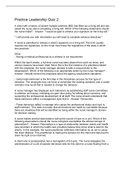Nur 221 quiz 1 - Study guides, Class notes & Summaries
Looking for the best study guides, study notes and summaries about Nur 221 quiz 1? On this page you'll find 20 study documents about Nur 221 quiz 1.
Page 2 out of 20 results
Sort by
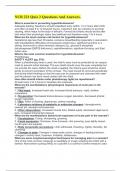
-
NUR 221 Quiz 2 Questions And Answers.
- Exam (elaborations) • 3 pages • 2024
-
- $9.49
- + learn more
NUR 221 Quiz 2 Questions And Answers. What is essential in preventing hyperbilirubinemia? Adequate feeding. Newborns should breastfeed early (within 1 to 2 hours after birth) and often (at least 8 to 12 times/24 hours). Colostrum acts as a laxative to promote stooling, which helps rid the body of bilirubin. Formula fed infants should be fed after birth when their physiologic status has stabilized and therefore every 3 to 4 hours. What are the most common risk factors for hyperbilirubinemia?...
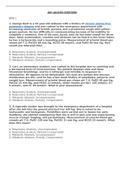
-
NUR 221 ABG ANALYSIS QUESTIONS AND ANSWERS.
- Exam (elaborations) • 14 pages • 2022
-
- $9.49
- 1x sold
- + learn more
NUR 221 ABG ANALYSIS QUESTIONS AND ANSWERS. QUIZ 1 1. George Kent is a 54 year old widower with a history of chronic obstructive pulmonary disease and was rushed to the emergency department with increasing shortness of breath, pyrexia, and a productive cough with yellowgreen sputum. He has difficulty in communicating because of his inability to complete a sentence. One of his sons, Jacob, says he has been unwell for three days. Upon examination, crackles and wheezes can be heard in the low...
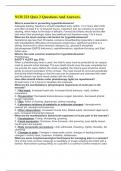
-
NUR 221 Quiz 2 Questions And Answers.
- Exam (elaborations) • 3 pages • 2024
-
- $10.78
- + learn more
NUR 221 Quiz 2 Questions And Answers. What is essential in preventing hyperbilirubinemia? Adequate feeding. Newborns should breastfeed early (within 1 to 2 hours after birth) and often (at least 8 to 12 times/24 hours). Colostrum acts as a laxative to promote stooling, which helps rid the body of bilirubin. Formula fed infants should be fed after birth when their physiologic status has stabilized and therefore every 3 to 4 hours. What are the most common risk factors for hyperbilirubinemia?...
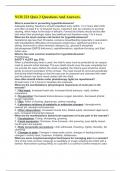
-
NUR 221 Quiz 2 Questions And Answers.
- Exam (elaborations) • 3 pages • 2024
-
- $9.99
- + learn more
NUR 221 Quiz 2 Questions And Answers. What is essential in preventing hyperbilirubinemia? Adequate feeding. Newborns should breastfeed early (within 1 to 2 hours after birth) and often (at least 8 to 12 times/24 hours). Colostrum acts as a laxative to promote stooling, which helps rid the body of bilirubin. Formula fed infants should be fed after birth when their physiologic status has stabilized and therefore every 3 to 4 hours. What are the most common risk factors for hyperbilirubinemia?...
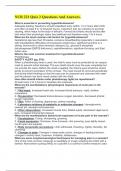
-
NUR 221 Quiz 2 Questions And Answers.
- Exam (elaborations) • 3 pages • 2024
-
- $9.49
- + learn more
NUR 221 Quiz 2 Questions And Answers. What is essential in preventing hyperbilirubinemia? Adequate feeding. Newborns should breastfeed early (within 1 to 2 hours after birth) and often (at least 8 to 12 times/24 hours). Colostrum acts as a laxative to promote stooling, which helps rid the body of bilirubin. Formula fed infants should be fed after birth when their physiologic status has stabilized and therefore every 3 to 4 hours. What are the most common risk factors for hyperbilirubinemia?...
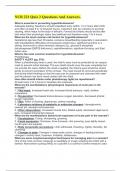
-
NUR 221 Quiz 2 Questions And Answers.
- Exam (elaborations) • 3 pages • 2024
-
- $10.79
- + learn more
NUR 221 Quiz 2 Questions And Answers. What is essential in preventing hyperbilirubinemia? Adequate feeding. Newborns should breastfeed early (within 1 to 2 hours after birth) and often (at least 8 to 12 times/24 hours). Colostrum acts as a laxative to promote stooling, which helps rid the body of bilirubin. Formula fed infants should be fed after birth when their physiologic status has stabilized and therefore every 3 to 4 hours. What are the most common risk factors for hyperbilirubinemia?...
NUR 221: Leadership for Exam 1//Practice Leadership Quiz 2
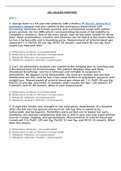
-
NUR 221 ABG ANALYSIS QUESTIONS AND ANSWERS LATEST 2022.
- Exam (elaborations) • 14 pages • 2022
-
- $9.49
- + learn more
NUR 221 ABG ANALYSIS QUESTIONS AND ANSWERS LATEST 2022. QUIZ 1 1. George Kent is a 54 year old widower with a history of chronic obstructive pulmonary disease and was rushed to the emergency department with increasing shortness of breath, pyrexia, and a productive cough with yellowgreen sputum. He has difficulty in communicating because of his inability to complete a sentence. One of his sons, Jacob, says he has been unwell for three days. Upon examination, crackles and wheezes can be heard...
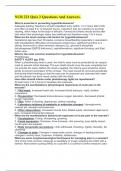
-
NUR 221 Quiz 2 Questions And Answers.
- Exam (elaborations) • 3 pages • 2024
-
- $9.99
- + learn more
NUR 221 Quiz 2 Questions And Answers. What is essential in preventing hyperbilirubinemia? Adequate feeding. Newborns should breastfeed early (within 1 to 2 hours after birth) and often (at least 8 to 12 times/24 hours). Colostrum acts as a laxative to promote stooling, which helps rid the body of bilirubin. Formula fed infants should be fed after birth when their physiologic status has stabilized and therefore every 3 to 4 hours. What are the most common risk factors for hyperbilirubinemia?...
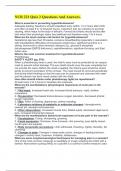
-
NUR 221 Quiz 2 Questions And Answers.
- Exam (elaborations) • 3 pages • 2024
-
- $10.29
- + learn more
NUR 221 Quiz 2 Questions And Answers. What is essential in preventing hyperbilirubinemia? Adequate feeding. Newborns should breastfeed early (within 1 to 2 hours after birth) and often (at least 8 to 12 times/24 hours). Colostrum acts as a laxative to promote stooling, which helps rid the body of bilirubin. Formula fed infants should be fed after birth when their physiologic status has stabilized and therefore every 3 to 4 hours. What are the most common risk factors for hyperbilirubinemia?...

Did you know that on average a seller on Stuvia earns $82 per month selling study resources? Hmm, hint, hint. Discover all about earning on Stuvia



